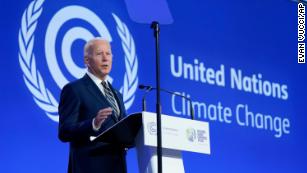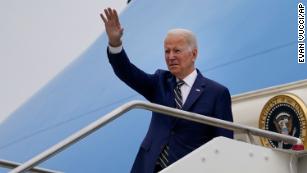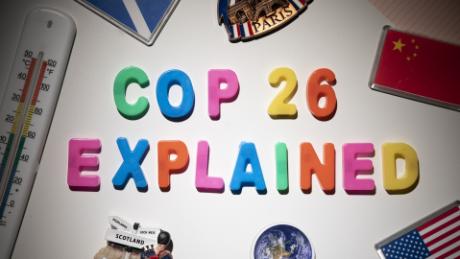By Ella Nilsen, CNN
Updated 0506 GMT (1306 HKT) November 2, 2021
(CNN)The Biden administration is proposing new rules from a number of federal agencies with the same goal: Slashing planet-warming methane emissions.At the center of the announcement is a regulation from the Environmental Protection Agency that would push oil and gas companies to more accurately detect, monitor and repair methane leaks from new and existing wells, pipelines and other equipment.The EPA estimates it would cut 41 million tons of methane emissions from 2023 to 2035 — more than all the carbon dioxide emitted by all US passenger cars and commercial planes in 2019.
Methane is a greenhouse gas around 80 times more potent than carbon dioxide in the short term, and experts have told CNN that reducing methane leaks is among the easiest ways to slow global warming. It is the main component of natural gas, which powers close to 40% of the US electricity sector. It can enter the atmosphere through leaks from oil and natural gas wells, natural gas pipelines and the processing equipment itself. Landfills and agriculture are also a source of methane emissions.
The EPA’s proposal comes as Biden attends the UN climate summit in Glasgow, where countries are gathering to raise ambitions to decarbonize their economies.”With this historic action, EPA is addressing existing sources from the oil and natural gas industry nationwide, in addition to updating rules for new sources, to ensure robust and lasting cuts in pollution across the country,” EPA Administrator Michael Regan said in a statement.

5 takeaways from the first day of COP26: Biden’s apology, India’s pledge, much disappointment
The Biden EPA rule would go further than that of former President Barack Obama’s EPA, which only covered new and recently modified equipment. It would also regulate natural gas that comes as a byproduct of oil production, which is often vented or flared, and cover leaks from compressor stations and gas-fired pneumatic controllers, all of which can be the sources of serious methane leaks.
If the rules are implemented, the agency says that would result in new routine monitoring at 300,000 well sites across the country.
“All told, the estimate is that about 75% of all methane emissions will be covered by this EPA rule,” a senior administration official told reporters. “Methane is obviously a key issue for the US.”The Department of Interior and Department of Transportation’s Pipeline and Hazardous Materials Safety Administration also announced a final rule to address the potent greenhouse gas. DOI’s proposed rule would combat emissions from wells on public lands by discouraging venting and flaring, while PHMSA is extending federal regulations to all onshore gas gathering pipelines, requiring companies to monitor and report leaks and safety information.
The US Department of Agriculture will focus on ways to capture methane from agriculture, working with farmers to identify ways to cut methane across the food chain. Although 30% of the nation’s methane emissions come from the oil and gas industry, methane from landfills and agriculture is also important to tackle, officials stressed.
The Biden administration has been looking for ways to achieve the President’s goal to slash US greenhouse gas emissions by around 50% by 2030. The administration is trying to show strong executive action to compliment Biden’s climate agenda in Congress, especially since some senators have not explicitly backed the economic framework that contains most of the Democrats’ climate measures.

Joe Biden wants America to lead the world against the climate crisis. That goal faces a big test this week.
One of those measures is a fee that would be levied on oil and gas companies that emit methane above a certain threshold, along with $775 million in grants and incentives to help companies stay below the threshold.
“The fee and the rules should be complementary tools,” the Environmental Defense Fund’s Jon Goldstein told CNN. “The rules are critical because if designed correctly they ensure across the board, comprehensive reductions. The fee has the ability to augment the regulations by leading to faster and potentially additional reductions.
“The administration is putting an emphasis on slashing methane emissions both at home and abroad, in hopes it will help limit global warming to 1.5 degrees Celsius, which scientists say the world should stay below to avoid the worst impacts of climate change.
Methane emissions from oil and gas “is the low hanging fruit, it’s the largest industrial source of methane emissions” in the US, Goldstein said.
Environmental groups also say capping leaks is good for oil and gas producers’ bottom lines, since so much potential product is escaping into the atmosphere.
“At the end of the day, what’s leaking is a product that can be sold,” said Julie McNamara, climate and energy deputy policy director at the Union of Concerned Scientists.
SOURCE: https://edition.cnn.com/2021/11/02/politics/epa-methane-regulations/index.html




